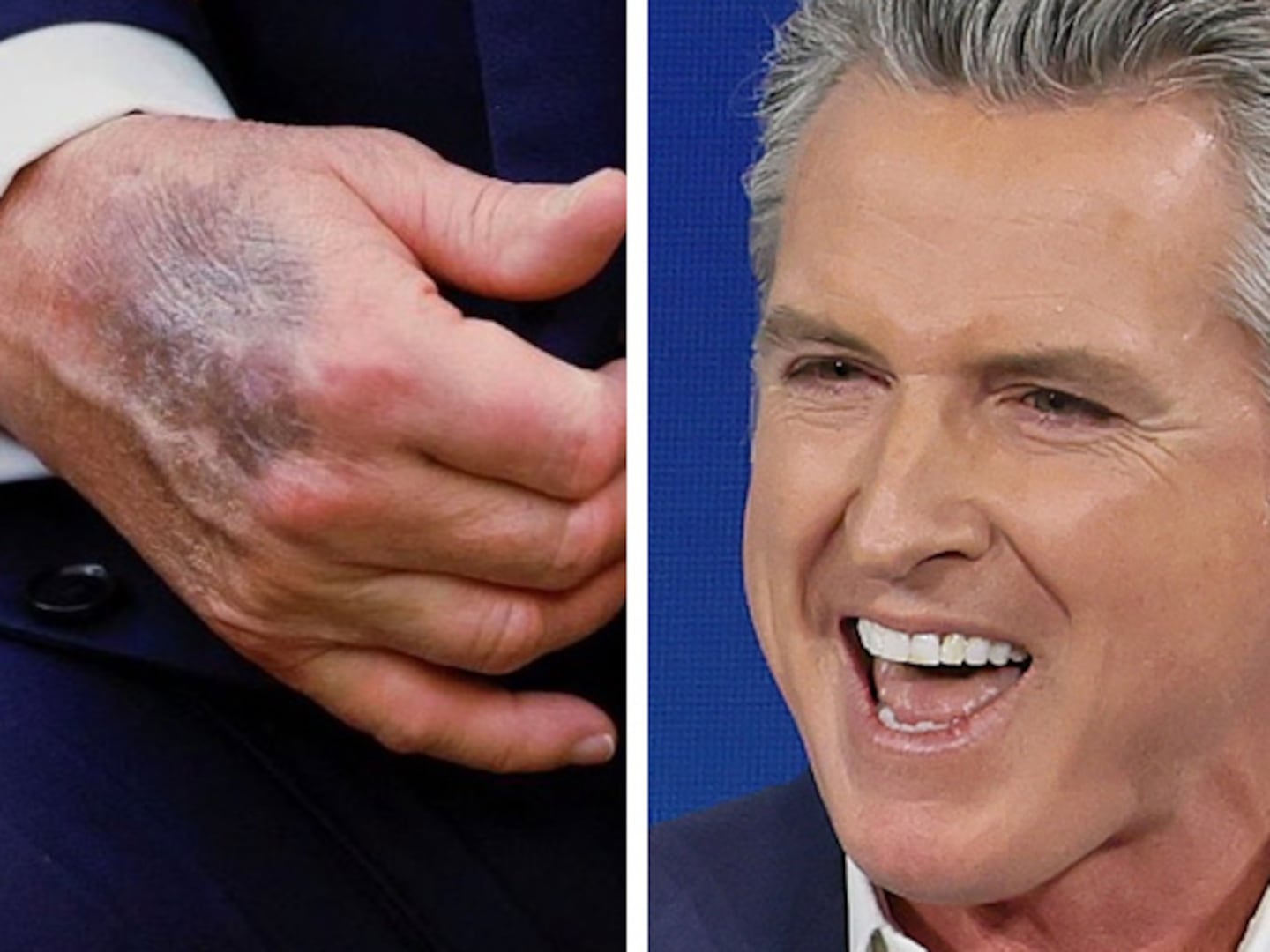It was something everyone in the room had clearly put a lot of thought into: Are Jews white?
“It’s an interesting question,” replied Richard Spencer, the 37-year-old University of Virginia grad and former journalist who’s become the de facto leader of America’s white nationalist movement. “I would say Jews are Jews.”
Spencer is the president of the National Policy Institute, a think tank “dedicated to the heritage, identity, and future of European people in the United States and around the world.” And this was the NPI’s big shindig, its biennial Halloween conference in the heart of downtown Washington, D.C. This year, it was held at the National Press Club, just two blocks from the White House, where the nation’s first black president resides.
Spencer tried to phrase his thoughts on the whiteness of Jewish people carefully. “The Jews exist precisely because they were apart,” he said. “Precisely because they had a sense of apartness—perhaps you could say a little bit of paranoia, about trying to stay away. That’s a clear aspect of Jewish—”
Then he caught himself. Jewish paranoia is an old anti-Semitic trope, and Spencer didn’t want to come across to the press like some old Nazi. He’s young and articulate and handsome in a generic way, a bit like a local TV weatherman. His aim is to give fascism a human face.
“Please don’t quote ‘paranoia,’” he said with a nervous smile, as he glared at the three journalists who showed up at his press conference Saturday afternoon.
It has been a big year for Spencer and company, who said the Washington conference drew its biggest crowd ever. About 175 people were in attendance, almost all of them men and, according to Spencer’s estimate, roughly half of them under 35.
“Before, I felt like I knew everyone in the room,” Spencer said. “I knew most editors of everything. We went to cocktail parties together.” Now, he said, his ideas are everywhere. “I can’t keep up with it.”
Part of the reason why, in Spencer’s words, his views are “metastasizing” is Donald Trump, whom Spencer described as an “icebreaker” for the white nationalist (or, to use his preferred label, “identitarian”) cause.
“I think Donald Trump does have something to do with it,” said Spencer, who claims he doesn’t vote. “To be honest, I’m rather skeptical that he’s going to, by the power of his negotiation ability, make America great again.
“However, what I think he’s done is that he’s delegitimized—and I think he’s to a degree he’s humiliated—mainstream conservatives, the elite of the GOP, and certainly the kind of fuddy-duddy conservative movement types, the National Review. He’s delegitimized them, he’s humiliated them, and I think that opens a space for someone else… it’s not so much Trump per se. It’s not like we think he’s going to save the world. It’s like we finally felt like we’re breaking through, that something’s breaking out, and what comes after Trump is going to be interesting.”
White nationalists like Spencer insist that, unlike other and previous racists, they are not motivated by hate. They don’t wear brownshirts or Klan robes. They are not violent. But they do look forward to the eventual dissolution of the United States and the creation of a new all-white republic, which explains their fascination with who is and who is not Caucasian. And to bring that new country into existence, explained former Klan lawyer Sam Dickson, a speaker at the conference, America needs is its own Mikhail Gorbachev.
“We need sound, sensible, humane leadership to accomplish the division of this country into normal ethno-states,” Dickson said. In his scenario, non-whites would inhabit liberal enclaves like New York and Massachusetts. “The blacks could be given Manhattan,” he said with a smirk.
Dickson said such a breakup could be possible within the next 10 years, while Spencer cautioned that there’s still much more to be done.
“Before any political change happens, there needs to be a revolution in people’s minds,” Spencer said. “It’s just not about a little party being slightly better on the immigration issue. We’re practicing the art of the impossible. Politicians practice the art of the possible. They’re realists, they want to build a coalition… we want to change the world, and that starts with radically changing people’s minds.”
And that’s what Spencer described as his mission. After obtaining a master’s degree in humanities from the University of Chicago, he became an assistant editor at The American Conservative, a magazine founded by Pat Buchanan. Fired from that job for his radical views, he then went to Taki’s Magazine, an online far-right publication, before rejecting conservatism entirely. Today, he sees himself as the intellectual architect for the new generation of white nationalists, a kind of William F. Buckley of racism. To that end, Spencer edits Radix Journal, a website he founded to promote his ideas about “racial identity.” He sees it as his National Review.
“I don’t like Buckley, but I like the comparison,” he said. “I’m not a fan of William F. Buckley, but the kind of idealized form of William F. Buckley as a big-tent builder—I would love to be that person.”
Asked where he gets the money to do all of this, Spencer said it all comes from donations and registration fees for NPI’s Halloween conference. “To be honest, this is a shoestring organization,” he said after glancing at his Apple Watch. “But what you’re able to do now with desktop publishing, what you’re able to do on the Web—that, in a way, makes this possible. What you really need is people who are fanatics like me.”
But even if, as Spencer said, the conference was a huge success, and the “identitarians” are on the march, plenty of attendees were happy to keep their identities secret.
As the conference began Saturday morning, half a dozen young people ran into the lobby wearing masks—a few masquerade, but mostly Groucho glasses. They filed into the elevator laughing and lamenting that they hadn’t run into the protesters they’d heard would be outside. Informed that they’d come in the wrong entrance and missed the protesters, they groaned.
They didn’t want to be photographed, they said, by way of explanation for the disguises. “We have jobs!” one of them said, though it sounded like he was saying “duh.”
Similarly, before a group photo was taken that afternoon, attendees were given the opportunity to turn their backs to the camera.
And few people in the organization look like they possess Spencer’s media-friendly, clean-cut looks. One speaker, folk singer R.N. Taylor, wore an off-yellow T-shirt that looked like it had once been white. Asked about his religious beliefs—nearly every speaker identified as an atheist—Taylor displayed his necklace to reporters.
“That’s Thor’s hammer,” he explained. “I’m a follower of the Germanic god Odin.”
The other attendees’ lack of polish notwithstanding, Spencer—sporting a rather hip short-on-the-sides, longer-on-top haircut that could pass in either Williamsburg or the Wehrmacht—said he’s convinced tomorrow belongs to them.
“This is what resonates with people’s lived world,” he said. “You can’t get away from race. You can’t get away from the great erasure that is the general tendency to delegitimize the white man.”
Olivia Nuzzi contributed to this story.






